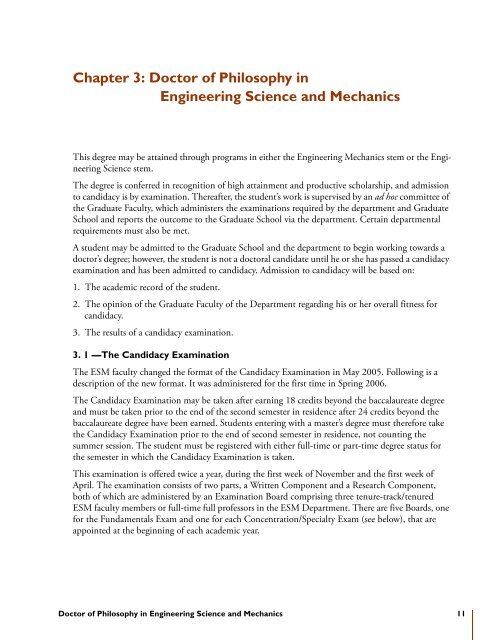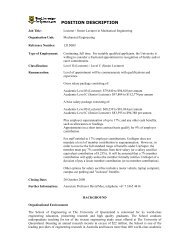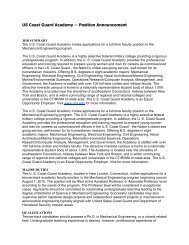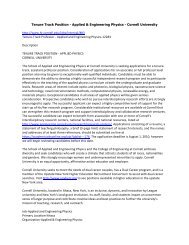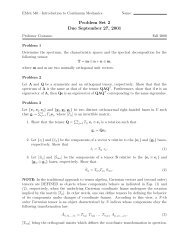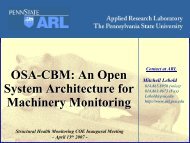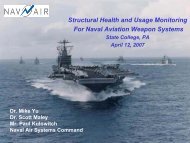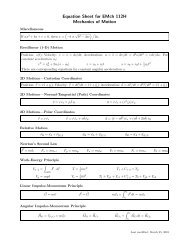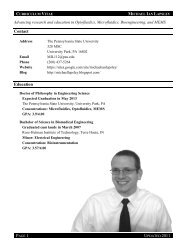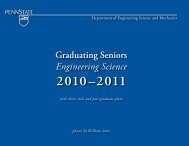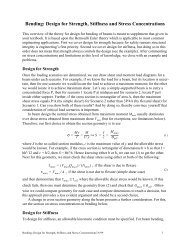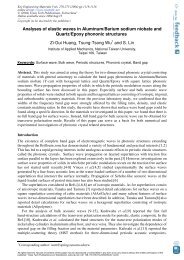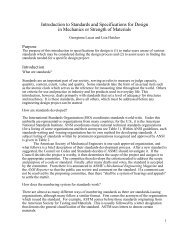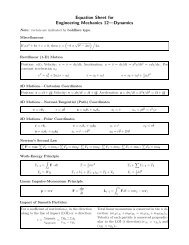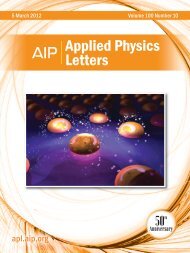ESM Graduate Student Guide - Department of Engineering Science ...
ESM Graduate Student Guide - Department of Engineering Science ...
ESM Graduate Student Guide - Department of Engineering Science ...
Create successful ePaper yourself
Turn your PDF publications into a flip-book with our unique Google optimized e-Paper software.
Chapter 3: Doctor <strong>of</strong> Philosophy in<br />
<strong>Engineering</strong> <strong>Science</strong> and Mechanics<br />
This degree may be attained through programs in either the <strong>Engineering</strong> Mechanics stem or the <strong>Engineering</strong><br />
<strong>Science</strong> stem.<br />
The degree is conferred in recognition <strong>of</strong> high attainment and productive scholarship, and admission<br />
to candidacy is by examination. Thereafter, the student’s work is supervised by an ad hoc committee <strong>of</strong><br />
the <strong>Graduate</strong> Faculty, which administers the examinations required by the department and <strong>Graduate</strong><br />
School and reports the outcome to the <strong>Graduate</strong> School via the department. Certain departmental<br />
requirements must also be met.<br />
A student may be admitted to the <strong>Graduate</strong> School and the department to begin working towards a<br />
doctor’s degree; however, the student is not a doctoral candidate until he or she has passed a candidacy<br />
examination and has been admitted to candidacy. Admission to candidacy will be based on:<br />
1. The academic record <strong>of</strong> the student.<br />
2. The opinion <strong>of</strong> the <strong>Graduate</strong> Faculty <strong>of</strong> the <strong>Department</strong> regarding his or her overall fitness for<br />
candidacy.<br />
3. The results <strong>of</strong> a candidacy examination.<br />
3. 1 —The Candidacy Examination<br />
The <strong>ESM</strong> faculty changed the format <strong>of</strong> the Candidacy Examination in May 2005. Following is a<br />
description <strong>of</strong> the new format. It was administered for the first time in Spring 2006.<br />
The Candidacy Examination may be taken after earning 18 credits beyond the baccalaureate degree<br />
and must be taken prior to the end <strong>of</strong> the second semester in residence after 24 credits beyond the<br />
baccalaureate degree have been earned. <strong>Student</strong>s entering with a master’s degree must therefore take<br />
the Candidacy Examination prior to the end <strong>of</strong> second semester in residence, not counting the<br />
summer session. The student must be registered with either full-time or part-time degree status for<br />
the semester in which the Candidacy Examination is taken.<br />
This examination is <strong>of</strong>fered twice a year, during the first week <strong>of</strong> November and the first week <strong>of</strong><br />
April. The examination consists <strong>of</strong> two parts, a Written Component and a Research Component,<br />
both <strong>of</strong> which are administered by an Examination Board comprising three tenure-track/tenured<br />
<strong>ESM</strong> faculty members or full-time full pr<strong>of</strong>essors in the <strong>ESM</strong> <strong>Department</strong>. There are five Boards, one<br />
for the Fundamentals Exam and one for each Concentration/Specialty Exam (see below), that are<br />
appointed at the beginning <strong>of</strong> each academic year.<br />
Doctor <strong>of</strong> Philosophy in <strong>Engineering</strong> <strong>Science</strong> and Mechanics 11


